A first-hand account
Repatriation flight for German travellers stranded in New Zealand: a first-hand account
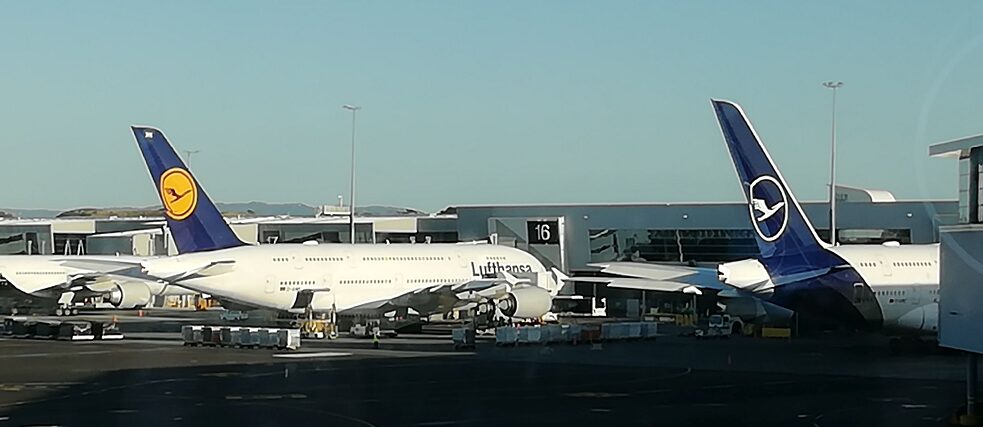
Airbus A380 in Auckland ready for departure | © Jennifer Barton
Jennifer and Manja, our former interns from the cultural section of Goethe-Institut Wellington, have just returned home from New Zealand to Germany on one of the repatriation flights organised by the German government. We asked them about their experiences at the end of their time in New Zealand, the flight home, and their arrival in Germany.
How did you make the decision to take one of the repatriation flights? And what did you do then?
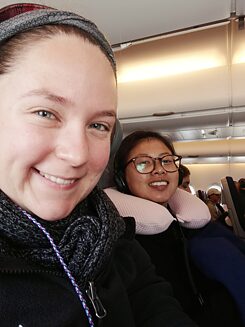 Jennifer and Manja on their repatriation flight from Auckland to Frankfurt
| © Jennifer Barton
Manja: It all happened in really quick succession, the closure of the borders, the impending lockdown, and deciding to fly back to Germany. My initial intention had been to stay in New Zealand and see how the situation developed. “New Zealand is safer, New Zealand has the pandemic well under control”, were the thoughts going through my mind. But then I started to wonder: how long would the restrictions apply? Was it really a good idea to stay here? How was I going to get home, and when? After a lot of to-ing and fro-ing, and talking it through with friends and family, I decided it was best to go home.
Jennifer and Manja on their repatriation flight from Auckland to Frankfurt
| © Jennifer Barton
Manja: It all happened in really quick succession, the closure of the borders, the impending lockdown, and deciding to fly back to Germany. My initial intention had been to stay in New Zealand and see how the situation developed. “New Zealand is safer, New Zealand has the pandemic well under control”, were the thoughts going through my mind. But then I started to wonder: how long would the restrictions apply? Was it really a good idea to stay here? How was I going to get home, and when? After a lot of to-ing and fro-ing, and talking it through with friends and family, I decided it was best to go home.Jennifer: It was the same with me. But once I had made the decision, it was a matter of signing up for the repatriation operation mounted by the German federal government, constantly checking my emails and the latest news, and preparing to pack up my things in record time. Two weeks later, when the confirmation of our flight home came through, departing from Auckland in two days’ time, we felt lucky to get 48 hours’ notice. So on the to-do list from then was booking a flight to Auckland, finding some accommodation there, and deciding to part with some of my choice op-shop purchases, since we were only allowed 23 kg of luggage on the flight home, as compared with the normal 30 kg. And of course we each had to say goodbye to the people in our “bubbles” in Wellington, our flatmates, who had made the lockdown experience much less painful than expected, and indeed quite enjoyable!
Tell us something about the flight.
Jennifer: Our flight from Auckland to Frankfurt took off at 9 a.m. on 10 April, but we had to be at the airport by 5 a.m. In fact, the process at the airport was really relaxed, much more so than usual. There were long queues at the check-in counter, but little sense of stress. If there was something unusual in the air, it wasn’t COVID-19 virus, but the sense of relief that we would soon be on our way home.The people who were under stress were the staff from the German Embassy in Wellington, who were walking up and down the queues, sorting out all the last-minute problems that people had. We could barely imagine what this team had managed to achieve over the past few days.
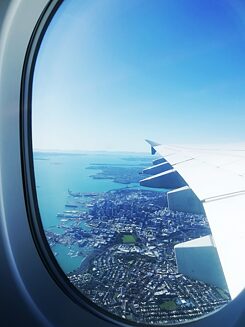 Low pass over Auckland
| © Jennifer Barton
And it was that feeling of gratitude for the people who had made our return flight possible that we took with us as we waited at gate 16, with loud applause for the whole Lufthansa crew as they walked through our ranks. It felt increasingly like being some sort of extra in a Hollywood film, and that feeling continued once we were on board.
Low pass over Auckland
| © Jennifer Barton
And it was that feeling of gratitude for the people who had made our return flight possible that we took with us as we waited at gate 16, with loud applause for the whole Lufthansa crew as they walked through our ranks. It felt increasingly like being some sort of extra in a Hollywood film, and that feeling continued once we were on board.With a breath-taking “circuit of honour” around the skies above Auckland, we took our leave of New Zealand, and settled down for our 25-hour flight, including a refuelling stop in Bangkok. As well as applauding our first crew as they walked off the plane, many of us also wrote a message of appreciation for the captain, since we had been told that this was his very last flight as a Lufthansa pilot.
What happened after you touched down in Germany?
Manja: 2 podcasts, 5 films and 25 hours later, we arrived back on German soil just after midnight on 11 April. We were so happy to have finally arrived – but it still took a long time before we were actually back home, in our own “four walls”. After a final round of applause, we were allowed to leave the aircraft, in small groups at a time. Things were really quiet at Frankfurt airport. We were warmly welcomed by the airport staff, and were given takeaway snacks. Friends and families were waiting excitedly for their loved ones. After Jenny and I had said goodbye, and she had set off on her comparatively short journey to Ludwigsburg, I still had the long train trip to Bremen ahead of me. Travellers returning home on the repatriation program were entitled to a free trip home on a Deutsche Bahn train. So some eight hours later, I was finally back home.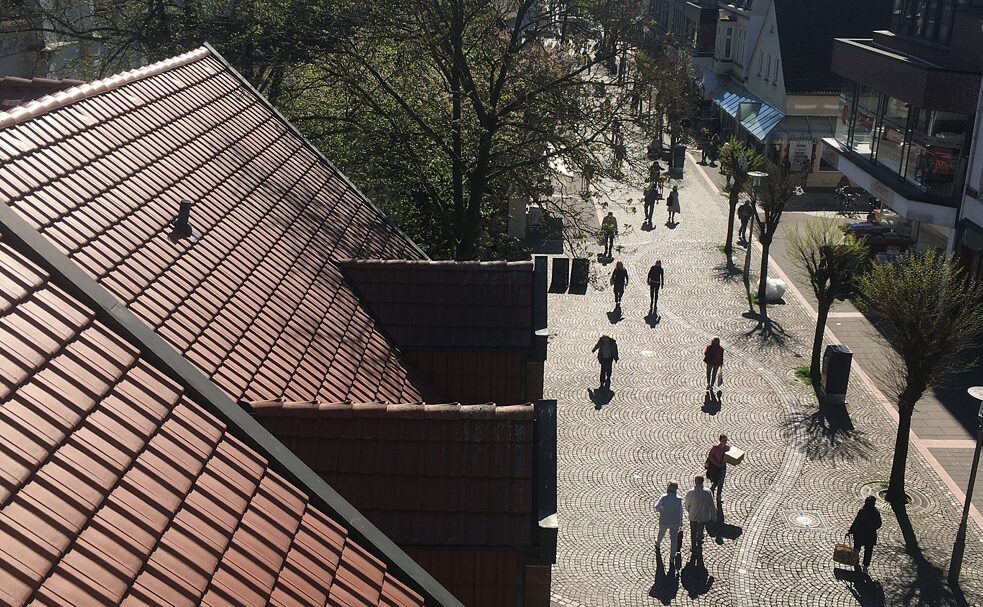 German town center in times of Corona
| © Manja Ngoc
German town center in times of Corona
| © Manja Ngoc
How does the situation in Germany compare to New Zealand?
Jennifer: The main difference with the lockdown in New Zealand is that on arriving from abroad, you are not allowed to leave your home at all for 14 days, not even to get some exercise from time to time. But from my conversations over the fence with neighbours, people seem to be quite relaxed about the situation here. But I will see how everyday life out of self-isolation actually feels in a few days’ time.Manja: It’s true that the situation is much more relaxed here in Germany than it was in New Zealand. Snack bars, weekly markets and ice-cream parlours have reopened. There are a lot of people out and about, strolling in the parks and in the city streets. That took a bit of getting used to, because the rules are a lot stricter in New Zealand.
Are you used to being back home in Germany now?
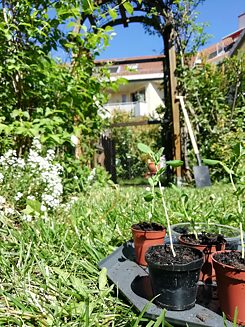 Quarantine gardening
| © Jennifer Barton
Manja: It’s nice to be back in Germany, but also a little bit strange. It feels quite surreal to think that just a few weeks ago you were at the other end of the world. But I have acclimatised much faster than I thought. There’s no place like home, as they say!
Quarantine gardening
| © Jennifer Barton
Manja: It’s nice to be back in Germany, but also a little bit strange. It feels quite surreal to think that just a few weeks ago you were at the other end of the world. But I have acclimatised much faster than I thought. There’s no place like home, as they say!Jennifer: In retrospect, my stay in New Zealand was ideal preparation for the situation here. On the one hand, being quarantined in Germany didn’t come as such a shock after the experience of being under lockdown in New Zealand – and also the relaxed Kiwi attitude stands us in really good stead: stay cool, we’ll get through this, and above all, be kind!
Jennifer Barton, 26, is studying for a degree in cultural studies and management in Ludwigsburg, and was an intern in the cultural section of Goethe-Institut Wellington from January to the beginning of April 2020. She then intended to spend four weeks travelling around New Zealand in a camper van. Spoiler: that didn’t happen.
Manja Vu, 23, is studying towards a degree in media cultural studies and media information technology in Cologne. She completed an internship in the cultural section of Goethe-Institut Wellington from September to December 2019. She then travelled around the North Island for three months, and was planning to spend another three months in the South Island. She made an early return to Wellington when the lockdown was declared after just one week of her time in the south.